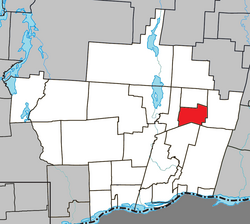Namur, Quebec
Namur | |
|---|---|
Municipality | |
 | |
 Location within Papineau RCM | |
 Namur Location in western Quebec | |
| Coordinates: 45°54′N 74°56′W / 45.900°N 74.933°WCoordinates: 45°54′N 74°56′W / 45.900°N 74.933°W[1] | |
| Country | Canada |
| Province | Quebec |
| Region | Outaouais |
| RCM | Papineau |
| Settled | 1865 |
| Constituted | January 1, 1964 |
| Government | |
| • Mayor | Gilbert Dardel |
| • Federal riding | Argenteuil—Papineau—Mirabel |
| • Prov. riding | Papineau |
| Area | |
| • Total | 58.10 km2 (22.43 sq mi) |
| • Land | 56.76 km2 (21.92 sq mi) |
| Population (2016)[3] | |
| • Total | 572 |
| • Density | 10.1/km2 (26/sq mi) |
| • Pop 2011-2016 | |
| • Dwellings | 389 |
| Time zone | UTC−5 (EST) |
| • Summer (DST) | UTC−4 (EDT) |
| Postal code(s) | J0V 1N0 |
| Area code(s) | 819 |
| Highways | |
| Website | www |

Namur is a town and municipality in the Outaouais region of Quebec, Canada, part of the Papineau Regional County Municipality. It is nicknamed "la Nouvelle Belgique" (New Belgium).[4]
The vast majority of the local population lives off the timber industry, which is marked by the Loggers Summer Festival. Furthermore, the area's excellent fishing and hunting opportunities attract many tourists annually.[4]
History[]
The first settlers arrived in the area in 1865, the majority originating from the Belgian Province of Namur and mostly Presbyterian Walloons; their family names were Edain, Frison, Pinon, Roquet, Fluhamann, and Van Vanious. In 1874, the Namur Post Office opened.[4]
From 1886 onward, the area was known as the United Township Municipality of Suffolk-et-Addington. Piece by piece, portions of this united township were detached to form new municipalities: Vinoy in 1920 (since 1996 part of Chénéville), Lac-des-Plages in 1950, and finally Namur in 1964.[4]
Demographics[]
| hideCanada census – Namur, Quebec community profile | |||
|---|---|---|---|
| 2016 | 2011 | ||
| Population: | 572 (-4.0% from 2011) | 596 (22.4% from 2006) | |
| Land area: | 56.76 km2 (21.92 sq mi) | 56.37 km2 (21.76 sq mi) | |
| Population density: | 10.1/km2 (26/sq mi) | 10.6/km2 (27/sq mi) | |
| Median age: | 54.2 (M: 55.0, F: 53.6) | 48.3 (M: 47.9, F: 48.6) | |
| Total private dwellings: | 389 | 348 | |
| Median household income: | $40,235 | $29,784 | |
| References: 2016[5] 2011[6] earlier[7] | |||
| Year | Pop. | ±% |
|---|---|---|
| 1986 | 479 | — |
| 1991 | 512 | +6.9% |
| 1996 | 543 | +6.1% |
| 2001 | 532 | −2.0% |
| 2006 | 487 | −8.5% |
| 2011 | 596 | +22.4% |
| 2016 | 572 | −4.0% |
| Source: Statistics Canada | ||
Mother tongue:[3]
- English as first language: 9.8%
- French as first language: 87.5%
- English and French as first language: 1.8%
- Other as first language: 0.9%
Education[]
This section needs expansion. You can help by . (September 2017) |
Sir Wilfrid Laurier School Board operates Anglophone public schools:
- Laurentian Regional High School in Lachute[8]
References[]
- ^ Reference number 43342 of the Commission de toponymie du Québec (in French)
- ^ Jump up to: a b Geographic code 80110 in the official Répertoire des municipalités (in French)
- ^ Jump up to: a b c "(Code 2480110) Census Profile". 2016 census. Statistics Canada. 2017.
- ^ Jump up to: a b c d "Namur (Municipalité)" (in French). Commission de toponymie du Québec. Archived from the original on 2016-03-03. Retrieved 2009-01-12.
- ^ "2016 Community Profiles". 2016 Canadian Census. Statistics Canada. February 21, 2017. Retrieved 2020-01-30.
- ^ "2011 Community Profiles". 2011 Canadian Census. Statistics Canada. July 5, 2013. Retrieved 2020-01-30.
- ^ "2001 Community Profiles". 2001 Canadian Census. Statistics Canada. February 17, 2012.
- ^ "LAURENTIAN REGIONAL HS ZONE." Sir Wilfrid Laurier School Board. Retrieved on September 4, 2017.
External links[]
![]() Media related to Namur, Quebec at Wikimedia Commons
Media related to Namur, Quebec at Wikimedia Commons
- Incorporated places in Outaouais
- Municipalities in Quebec
